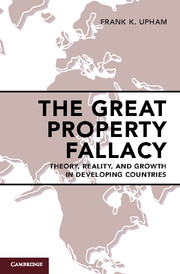Book contents
- Frontmatter
- Dedication
- Contents
- Preface
- Acknowledgments
- 1 Introduction
- 2 Physics Envy: Property Rights in Development Theory
- 3 Property and Markets: England and America
- 4 Property and Politics: Japan
- 5 Law and Development without the Law Part: China
- 6 Theory in Action: Cambodia
- 7 Property Rights and Social Change
- Index
7 - Property Rights and Social Change
Published online by Cambridge University Press: 19 January 2018
- Frontmatter
- Dedication
- Contents
- Preface
- Acknowledgments
- 1 Introduction
- 2 Physics Envy: Property Rights in Development Theory
- 3 Property and Markets: England and America
- 4 Property and Politics: Japan
- 5 Law and Development without the Law Part: China
- 6 Theory in Action: Cambodia
- 7 Property Rights and Social Change
- Index
Summary
In 1951, before neo-institutional economics, before law and development, and at the dawn of the concept of economic development itself, the United Nations identified the crux of the problem facing all societies hoping to advance:
There is a sense in which rapid economic progress is impossible without painful adjustments. Ancient philosophies have to be scrapped; old social institutions have to disintegrate; bonds of caste, creed and race have to burst; and large numbers of persons who cannot keep up with progress have to have their expectations of a comfortable life frustrated. Very few communities are willing to pay the full price of economic progress.
In the preceding chapters I have used case studies from the sixteenth to the twenty-first centuries to describe the role of property rights both in the scrapping of deeply rooted normative, behavioral, and institutional structures and, equally important, in the alleviation and legitimation of the concomitant social cost.
My goal has not been to provide precise answers to the pressing questions facing developing countries today. Human society is simply too complex for either abstract theory or a series of case studies to create the detailed roadmap that many understandably wish for, but some level of generalization from past experience is our only hope for understanding the process of rapid economic growth and social change.
To that end, in the next section I introduce two ideas from Joseph Schumpeter's Capitalism, Socialism, and Democracy to highlight common patterns from the diversity of the case studies and to understand why those patterns – recognized by the United Nations over sixty years ago – have eluded our contemporary understanding of the growth and development process. In the subsequent section, I focus on the different roles played by formal legal institutions in the deeply political processes described in the case studies. I then bring into the foreground what has been in the background of each narrative: whether the destruction of property rights in the pursuit of aggregate social benefit is legitimate, first in terms of the rule of law, then from a broader political perspective. I conclude with the implications of productive destruction of property rights for contemporary development practice.
- Type
- Chapter
- Information
- The Great Property FallacyTheory, Reality, and Growth in Developing Countries, pp. 131 - 146Publisher: Cambridge University PressPrint publication year: 2018



